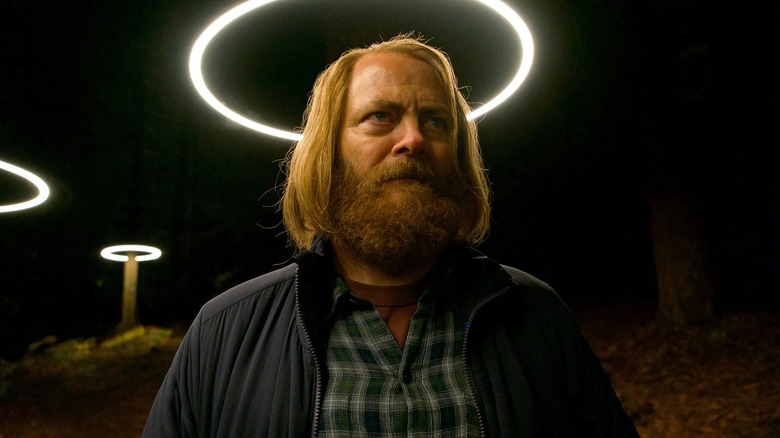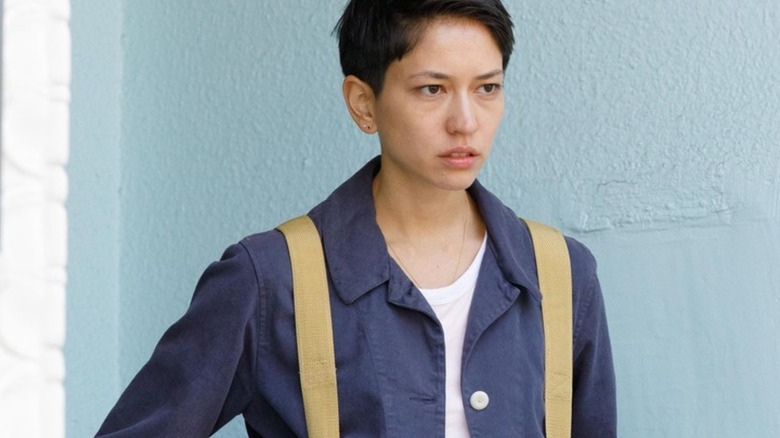The Most Ambitious Sci-Fi Miniseries On Hulu Comes From Ex Machina's Visionary Director
Even a cursory glance at Alex Garland's "Ex Machina" reveals a thematic tension between free will and determinism. In the film, the existence of a sentient robot named Ava (Alicia Vikander) is posed as an inevitability, where she needs to undergo a Turing test that will determine whether she has developed a consciousness. The men of science who gauge Ava's humanity (or lack thereof) view an A.I. singularity as inevitable or deterministic.
Specifically, the fact that a robot like Ava can express emotions and mimic human behavior is seen as an inevitability — a question of "when," not "if." This outlook sidelines every ethical dilemma that comes with the creation of artificial intelligence and whether humans have the right to play god while toying with sentience. Garland uses this foundation to weave a profound film about technology, evolution, and the fraught relationship between man and his creation.
When Alex Garland's limited series "Devs" launched its first-look trailer during 2019's New York Comic Con, the director spoke at length about the theme of determinism that clearly runs through the FX show (via TV Guide):
"I read more about science than anything else, and it started with two things. One was getting my head around this principle of determinism, which basically says that everything that happens in the world is based on cause and effect ... That has all sorts of implications for us. One is that it takes away free will, but the other is that if you are at a computer powerful enough, you could use determinism to predict the future and understand the past."
"Devs" revolves around Lily (Sonoya Mizuno), a software engineer who works for Amaya, a mega-tech company that casts a rather sinister shadow with its mere presence. Someone close to Lily dies, which prompts a quest for the truth that leads her down a dizzying rabbit hole filled with everything from deterministic philosophy to quantum computing. Garland crafts a convoluted, ambitious sci-fi series that asks pertinent questions, but is "Devs" any good? Let's dive into it.
Alex Garland's Devs is a brilliant tease of a story that feels mostly half-baked
"Devs" is not the kind of television that takes half-hearted stabs at the philosophical questions it tackles. Garland pours every ounce of delicate care into the show's unique essence: It is sweeping, hauntingly beautiful, and often deliberately claustrophobic. Every high-brow idea teased throughout its eight episodes is fed to us with a controlled hand, and we are supposed to think along as the show's central mystery unravels.
But sometimes, this same controlling hand begins to suffocate, testing even the most patient among us. Most of the characters are limited to repeating futile cycles because of — you guessed it — determinism, which drastically reduces the scope (and impact) of their tragedy. When someone exercises free will, "Devs" makes it seem easily achievable for anyone possessing even an ounce of bravery. After this happens one too many times, the conflicts feel a bit stale, despite never being predictable.
Lily is not the only person trapped in this labyrinth, as Amaya's founder and CEO Forrest (Nick Offerman) is a steadily ominous presence throughout the show. Forrest builds a supercomputer that uses deterministic principles to know everything, which allows it to comb through the past and future by using causality as a yardstick. When we peel back the layers of why a tech mogul like Forrest would do what he does, the answer lies in grief, which coagulates into an open, untreated wound.
His motivation is simple, but Garland treats Forrest's essential, relatable emotions as secondary to the scientific foundation of the cold, stoic world he builds. The human drama is present, yet not hyper-essential, as our eyes are repeatedly diverted to the philosophical concepts that Forrest's supercomputer juggles as a part of its purpose.
"Devs" deserves more hype, for sure, as there is plenty to mull over in this beautiful, languid show about ideas that might take precedence over everything else in a future that is more sterile than we'd like it to be. Although Garland's story often sinks under its own ambition, it's still interesting enough to challenge audiences and their preconceived notions about meditative television.

